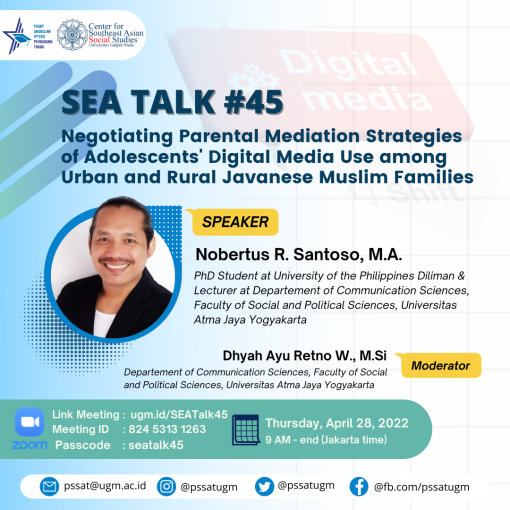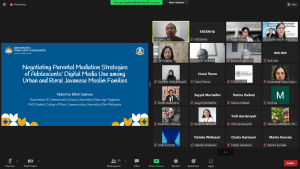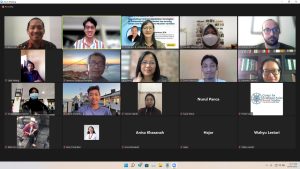
“In this era where digital use has become undeniably massive, easy access to the internet appears to be central for everyone including children. As a result, it is necessary for parents to safeguard their children from the internet’s double-edged sword, which, despite so many benefits it offers, also exposes them to some detrimental exposure”, said Nobertus R. Santoso, a lecturer of communication science in Universitas Atma Jaya Yogyakarta at the 45th South East Asia Talk (SEA TALK) webinar series, organized by the Center for Southeast Asian Social Studies (CESASS), Universitas Gadjah Mada.
This topic “Negotiating Parental Mediation Strategies of Adolescents’ Digital Media Use among Urban and Rural Javanese Muslim Families” is Nobertus’s initial finding of his PhD project at Mass Communication college, University of the Philippines.
Revolving around the culture of Javanese Muslim families, heinvestigates how parents adjust with the new normal of digital use and adopt mediation strategies with the principle of maximizing benefits and minimizing online risks. He specifically pays attention to parental mediation strategies by integrating three levels of analysis, which are cultural level, parental level, and adolescent level.
By looking at the cultural level, Javanese and Islamic values influence the parenting nature, such as tata krama(Javanese word for politeness) and traditional parental roles. He found out that the role of Javanese father is the breadwinner of the family who should protect their adolescents from the dangers of digital use andto provide education as well as financial needs, while Javanese mother, as the caretaker, has a huge responsibility to help their children develop their characters while also protecting Islamic values in their homes.Interestingly, many people were unaware that this restrictive role was based on the concept of “women’s status” in Indonesian muslim families, which Julia Suryakusumacoined as “state motherism/ibuism”—an ideology that defines women as appendages and companions to their husbands, as procreators of the nation, affirming their roles as mothers and educators of children, as housekeepers, and as members of Indonesian society—in that exact order.[1]
At the second level of study, the parental level, it is demonstrated how Javanese parents employ various parenting styles that influence adolescents’ growth such as permissive, authoritarian, authoritative, and neglectful or uninvolved. It is also important to know that parenting practices in Javanese Muslim families prioritize obedience, religious beliefs, politeness, and therefore it is parents’ duty to teach their children how to utilize digital platforms responsibly while at the same time mitigate the negative impacts that come with them.
Lastly, through the adolescent level, Nobertusobserved how the digital savvy adolescents who now seem to live their lives online tend to conceal their internet activities from their parents. In addition, digital media platforms prompt adolescents to generate a sense of social expectations: freedom, trust, autonomy, and responsibility for digital media use. However, it is also important to note that demographic backgrounds determine to what extent adolescents are exposed to digital media use, as urban adolescents clearly have more exposure to digital use compared to adolescents who live in rural areas. Thus, these characteristics should be considered in researching parental mediation strategies.
Nobertus study fills the gap in which previous studies has focused on the role of Muslim mothers by equally pay attention to include Muslim father’s role in managing adolecents’ internet use under the intersection of cultural, religious, and geographical settings.His field study was conductedin March 2021in Yogyakarta, Indonesia.


[1] Suryakusuma, Julia I. (1996). “The State and Sexuality in New Order Indonesia.” In Laurie Sears (ed.), Fantasizing the Feminine in Indonesia. Durham: Duke University Press, p. 101.
Author Press Release by Miranda Titania & Sayyid Al Murtadho
